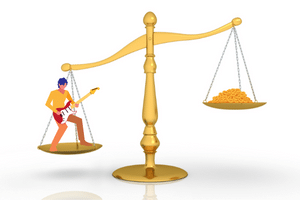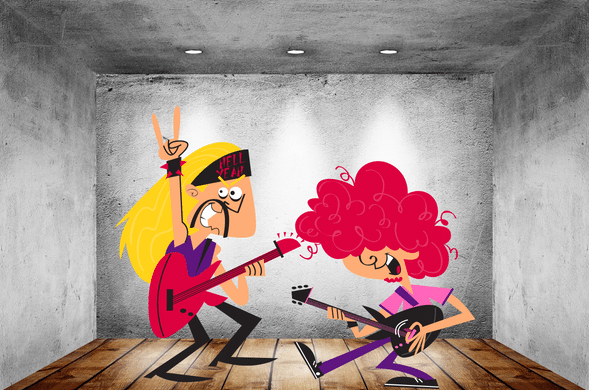I’m often asked why do bands have 2 guitarists. In this article, I’ll reveal the most compelling reasons, along with the downsides of this band format.
Keep reading to get all the answers!
You can use the table of contents below to take you to the area that interests you. Click on the little box to open it, and then click on the section of the article you want to read, or you can read from start to finish if you want the full guitar band experience!
The Short Answer
The most common reason bands have 2 guitarists is that one guitar can play rhythm (cords), and the other can play lead (solos). Splitting the two guitars into separate roles can give the band more musical flexibility and creativity. In some bands, the two guitarists switch roles depending on the song. Two guitar players can also give the band a bigger (thicker) sound.
Keep On Reading (Below) To Learn More
So, What’s The Difference?

When I speak of guitarists in this article, I mean six or seven-string guitar players, so the bass guitar player has been excluded from the discussion (but don’t take it personally if you hold down the low end).
Bands can have one, two, three, or even more guitar players. Each arrangement has its pros and cons, which are listed below.
When a band is defining its sound, it’s not unusual to start with a single guitar player and add a second one or to pair down the total number of players.
Keep reading to learn more.
Advantages Of Having Two Guitar Players

Here are some of the reasons a band might have two guitarists.
Creating A Signature Sound
Some bands gravitate to having a second guitar player to enhance their sound. This arrangement usually occurs when the band has a player with an unorthodox style but needs a second player to make it work musically.
A great example is The Shadows. Hank Marvin created some truly innovative melodic parts, while Bruce Welch provided a wonderful complementary rhythmic sound. There was nobody like The Shadows.
Listen to just a few bars of music without the lyrics, and you’ll hear the unmistakable sound of The Shadows.
Getting A Bigger (Thicker) Sound
A second guitarist makes the band’s overall sound “bigger,” with a sound that has fewer musical “gaps.” An excellent example is the Rolling Stones, which has always been a two-guitar band.
Just listen to the way the guitar parts are “woven together” on any of their albums.
Having More Harmonic And Tonal Variation
Harmonic and tonal variation are essential elements for bands. With two guitarists, more complex harmonies are possible. One player can have a cleaner sound while the guitar is overdriven or distorted.
Playing Simultaneous Rhythm And Lead
One great advantage of having two guitarists is that one can play rhythm while the other plays lead. This can give a guitar solo more “room to breathe” since the background rhythm fills in the gaps.
You can hear the big difference between two-player bands and the classic “power trios,” with drums, one guitar, and bass, like Cream and The Jimi Hendrix Experience. It’s a totally different sound!
Adding A Double Lead Sound
The “double lead sound” can supercharge a song with solos that seem to jump out at the listener. Each guitarist can play a complimentary solo part or the same solo in different octaves.
Have a close listen to Thin Lizzy, and you’ll get the picture.
Switching Parts Seamlessly
Two guitar players can switch between rhythm and lead parts easier than one. When a single guitarist moves between parts, it can sound less smooth and even a little choppy.
Jimi Hendrix was a bit of an exception, a master at switching between rhythm and lead, and frequently augmented his playing with chord melodies!
Enhancing Musical Experimentation
Two heads, or in this case, guitar players, are better than one. It’s not uncommon for one guitarist to come up with an idea or riff and the other player takes it to the next level. This musical brainstorming can continue until the song takes on a totally new sound.
The Stones are famous for this type of experimentation!
Compensating For Technical Shortfalls
Inevitably, one of the two guitarists will be better at specific playing techniques than the other, and vice-versa. This can help increase the band’s versatility and repertoire.
Performing With Only One Guitar Player
As a practical point, if one guitarist cannot play with the band, the other can temporarily fill in the gaps until the band can be reconstituted. This can help keep a band gigging and making money to avoid losing bookings and financial hard times!
Developing Ideas For New Material
Adding an extra guitar player can give the band an edge in coming up with ideas for new material to help keep the music fresh-sounding and more marketable. This can be a real advantage in the recording studio.
Disadvantages Of Having Two Guitar Players

Here are some of the downsides of having a two-guitarist band.
Sound Can Become Muddy
The sound can become less distinct or muddy depending on the guitarists, musical genre, equipment, and venue. This is more likely if both guitarists play with a lot of distortion.
Creative Disagreements And Dominance
More ideas can also foster creative disagreements among players, and it’s one of the common causes of bands breaking up. It’s not unusual for one guitarist to exert compositional dominance over the other.
Counterproductive Onstage Competition
A two-guitar player band can breed counterproductive onstage competition. This can lead to deviating from the structure of the song, unnecessarily long guitar solos, and audience disapproval.
Complacency Of One Guitarist
One guitar player may become complacent during the songwriting process and depend on the other guitarist to do more work, especially when one guitarist is technically better.
Hiring Expenses Can Increase
Adding a second guitar player can make it more expensive to hire the band. This can be problematic for local bands, who are often replaced by a DJ.
If the band has limited public recognition and popularity, more band members could lead to less payment per musician.
Bands With Two Guitar Players

Here are ten bands that have two guitar players (yes, Ian Anderson also plays guitar in the band Jethro Tull).
- Angus & Malcolm Young (AC/DC)
- Keith Richards & Ronnie Wood (Rolling Stones)
- Joe Perry & Brad Whitford (Aerosmith)
- James Hetfield & Kirk Hammett (Metallica)
- Dave Mustaine & Kiko Loureiro (Megadeth)
- Glenn Tipton & K.K. Downing (Judas Priest)
- Slash & Richard Fortus (Guns N’ Roses)
- Robert Fripp & Adrian Belew (King Crimson)
- Hank Marvin & Bruce Welch (The Shadows)
- Martin Barre & Ian Anderson (Jethro Tull)
Do You Need Two Guitar Players?

Although more than one guitarist can be an advantage, there are many excellent bands with one guitar, bass, and drums (the “power trio”) and sometimes a keyboard player. These bands tend to have some of the most iconic players!
Here are a few of the greats in Rock, Metal, Blues, and Jazz (not listed in any particular order).
- Jimi Hendrix
- Jimmy Page (Led Zeppelin)
- Jeff Beck (Jeff Beck Group)
- Eric Clapton (Eric Clapton Band)
- Ritchie Blackmore (Deep Purple)
- Tony Iommi (Black Sabbath)
- David Gilmour (Pink Floyd)
- Ted Nugent
- B. B. King
- Albert King
- Albert Collins
- Freddie King
- Buddy Guy
- Wes Montgomery
- Django Reinhardt
Bands With Three Or More Guitar Players

I’m sure you recognize some or all of these multi-guitarist bands, who are all awesome in their own right!
- Gary Rossington, Allen Collins, & Steve Gaines (Lynyrd Skynyrd)
- Adrian Smith, Dave Murray, & Janick Gers (Iron Maiden)
- Buck Dharma, Eric Bloom, Allen Lanier, & Joe Bouchard (Blue Oyster Cult)
- Bruce Springsteen, Steven Van Zandt, Nils Lofgren, & Patti Scialfa (E Street Band)
- David Crosby, Stephen Stills, Graham Nash, & Neil Young (Crosby, Stills, Nash, & Young)
Frequently Asked Questions

Here are some of the questions I get asked about guitars and guitar players.
If your question does not appear here, please put it in the comments, and I will get right back to you with an answer.
What Is The Secret To Playing Guitar?
There’s no secret to learning to play the guitar. Successful players create a practice schedule and consistently follow a practice method. Some beginners learn by experimenting and listening to what others have done, while others follow a more structured methodology.
What Percentage Of Guitar Players Quit?
According to Fender Musical Instruments Corporation, 90% of people learning to play guitar quit within the first three months. Please don’t be one of them!
Why Do Guitarists Sweat So Much?
Guitar players mainly sweat due to performance anxiety and the heat of the stage spotlights. Guitar players don’t sweat more than anyone else under normal circumstances.
What Makes A Guitarist Unique?
Each guitarist has their own playing, picking, and compositional style, which includes musical dynamics and accents. For example, the way a particular guitarist does string bends and vibrato.
Which Guitar Style Is Easiest?
There is no guitar-playing style that is definitely easier than another. Each style (e.g., Rock, Blues, Jazz, Country, Classical) can take a lifetime to master!
What Are The Types Of Guitarists In A Band?
There are three classifications of guitarists in a band. Lead players do all or most of the guitar solos, rhythm players lay down the guitar harmony with chords and arpeggios, and solo players perform any combination of harmony, melody, and chord melody.
Final Thoughts

I hope you found this article on “why do bands have 2 guitarists” helpful. Two guitar players give a band more creative options and flexibility. One guitarist can play rhythm and the other can play lead, or they can switch parts as necessary. The additional guitar player also gives the band a thicker sound.
Some bands begin with a single guitar player and then another one or two in an attempt to define their unique sound.
Having two guitar players has many advantages and disadvantages, so each band must weigh the pros and cons and experiment to see what works best.
Many of the most successful bands have a single guitar player, like the “power trios” of the 1960s.
Bands with three or more guitar players are less common, but many of them have gone on to have great success!
Here’s an outstanding video from Rick Beato, who counts down his list of the 20 greatest two-guitar bands. He talks about some bands I didn’t mention and many others. If there’s a band you think deserves to be mentioned, please tell me in the comments below!

Related Article ➡ Why Guitarists Change Guitars Between Songs – Ultimate Guide
What To Read Next ➡ The Benefits Of Playing Guitar In A Band: A Game Changer!
Tell Me What You Think

Please leave a comment below if you enjoyed this article, have any questions about guitar bands, or want to give your point of view. I will be happy to help you.
- What is your favorite guitar lineup, one, two, or three guitar players?
- What is the most significant advantage and disadvantage of having two guitarists?
- Are you currently thinking of adding another guitarist to your band? Why?
- If I left out your favorite 2-guitarist band, tell me who it is!
- What else is on your mind?



I agree with you on the flexibility of two or more guitarist to switch roles when playing. And like the usual saying, the more the better. On the challenge of creative disagreement, you find it every where there is a mix of professionals. The easiest way out is constant practise. They should practise together. That way, they will flow without breaking ranks
Hi, Ayodeji
Thank You for your comments!
Yeah, I really enjoy listening to bands with two or more guitar players, and it’s my favorite performance format! When you have two guitarists, it gives both players “room to musically stretch out.”
In popular music, it’s not so easy to control creative disagreements, no matter how much bands practice together! It’s one of the most common causes of “band breakup.” A lot of egos at play, with clashes at every turn. 😎
Frank 🎸
This is interesting to read. I always thought you had one bassist and one guitarist, but now that you mention it, it is true that multiple bands have more than one guitarist.
Do you think many bands will continue to have multiple guitarists in this world of technology that we live in today with computers and whatnot?
Hi, Gate
Thank You for your comments!
I’m so glad you liked the article!
In the world of live, non-computer-generated music, I think that multiple guitarists will be around for many years!
You should give the guitar a try! 😎
Frank 🎸